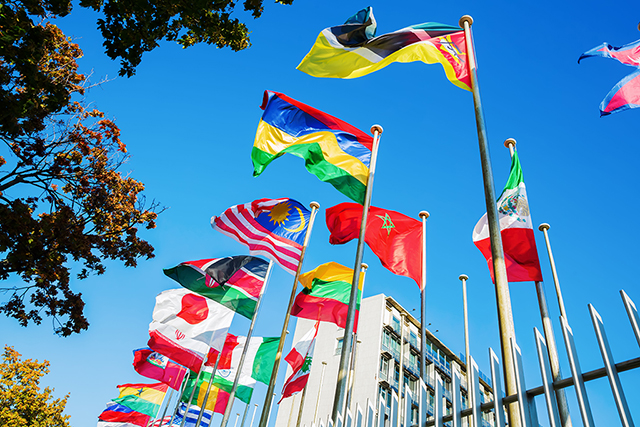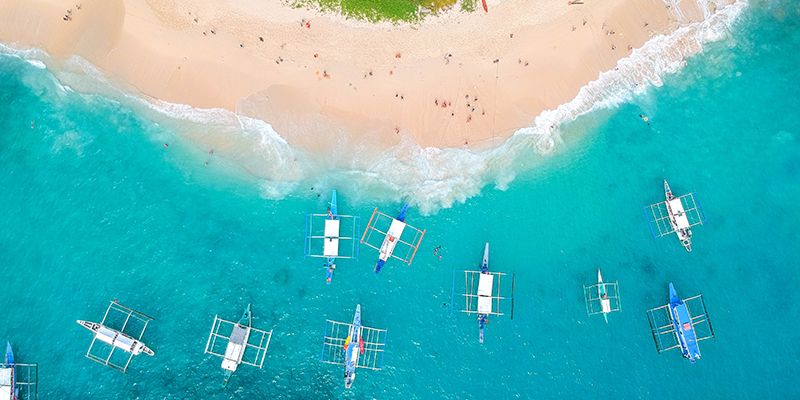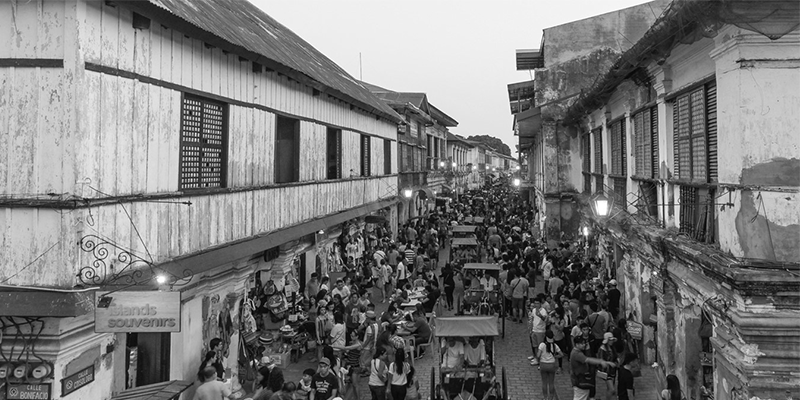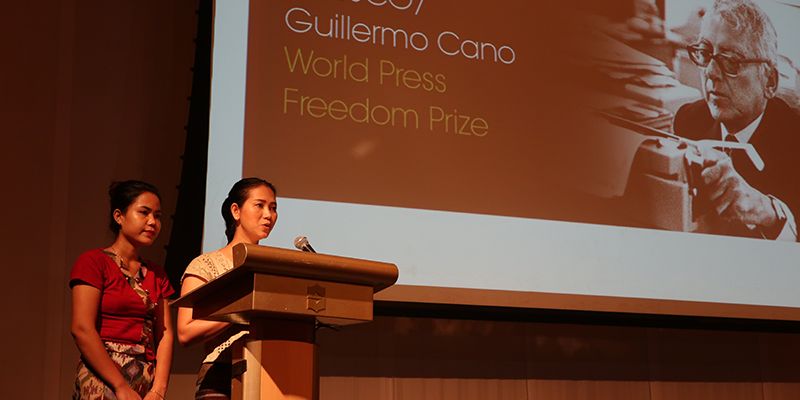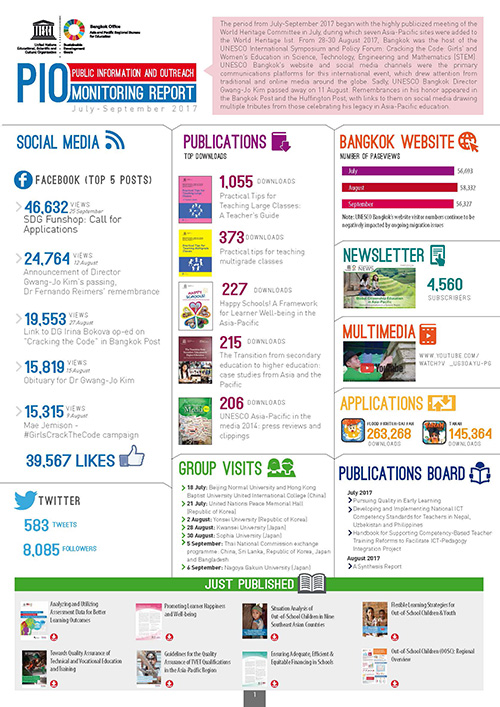Public Information and Outreach (PIO) Monitoring Report
PIO Monitoring Report, January - March 2019
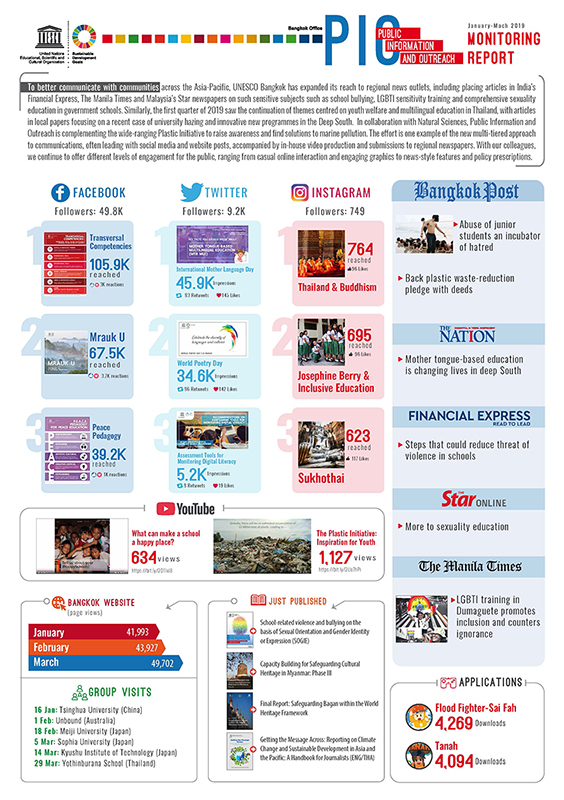 To better communicate with communities across the Asia-Pacific, UNESCO Bangkok has expanded its reach to regional news outlets, including placing articles in India’s Financial Express, The Manila Times and Malaysia’s Star newspapers on such sensitive subjects such as school bullying, LGBTI sensitivity training and comprehensive sexuality education in government schools. Similarly, the first quarter of 2019 saw the continuation of themes centred on youth welfare and multilingual education in Thailand, with articles in local papers focusing on a recent case of university hazing and innovative new programmes in the Deep South. In collaboration with Natural Sciences, Public Information and Outreach is complementing the wide-ranging Plastic Initiative to raise awareness and find solutions to marine pollution. The effort is one example of the new multi-tiered approach to communications, often leading with social media and website posts, accompanied by in-house video production and submissions to regional newspapers. With our colleagues, we continue to offer different levels of engagement for the public, ranging from casual online interaction and engaging graphics to news-style features and policy prescriptions.
To better communicate with communities across the Asia-Pacific, UNESCO Bangkok has expanded its reach to regional news outlets, including placing articles in India’s Financial Express, The Manila Times and Malaysia’s Star newspapers on such sensitive subjects such as school bullying, LGBTI sensitivity training and comprehensive sexuality education in government schools. Similarly, the first quarter of 2019 saw the continuation of themes centred on youth welfare and multilingual education in Thailand, with articles in local papers focusing on a recent case of university hazing and innovative new programmes in the Deep South. In collaboration with Natural Sciences, Public Information and Outreach is complementing the wide-ranging Plastic Initiative to raise awareness and find solutions to marine pollution. The effort is one example of the new multi-tiered approach to communications, often leading with social media and website posts, accompanied by in-house video production and submissions to regional newspapers. With our colleagues, we continue to offer different levels of engagement for the public, ranging from casual online interaction and engaging graphics to news-style features and policy prescriptions.
PIO Monitoring Report, October - December 2018
 In the final quarter of 2018, UNESCO Bangkok emphasized placing timely opinion articles in regional media, linked to news relevant to the Office’s work and policies. In one example that made headlines worldwide, the Culture Section responded to the Intangible Cultural Heritage listings in November with an article on the khon and lkhon khol listings in Thailand and Cambodia respectively, directly confronting narrow nationalistic views claiming ‘ownership’ of ICH – in complete contradiction with the spirit of the listings. Other articles responding to breaking news with informed policy focused on a school assault in Thailand and the death of a young boy fighting professionally in the Muaythai ring. The emphasis on timely, relevant outreach was also reflected in the evolving social media strategy, with the launch of the Office’s Instagram account reaching out to new audiences with clear, engaging messaging based on inspirational images. The goal of distilling key programme elements for public consumption was also complemented by the launch of an infographic series conveying UNESCO’s programmes visually and through key data points. The Office also sought to leverage these strategies in collaboration with UNESCO Offices in the region, in particular partnering with the Myanmar Antennae Office to highlight their important work on Education and Freedom of Expression.
In the final quarter of 2018, UNESCO Bangkok emphasized placing timely opinion articles in regional media, linked to news relevant to the Office’s work and policies. In one example that made headlines worldwide, the Culture Section responded to the Intangible Cultural Heritage listings in November with an article on the khon and lkhon khol listings in Thailand and Cambodia respectively, directly confronting narrow nationalistic views claiming ‘ownership’ of ICH – in complete contradiction with the spirit of the listings. Other articles responding to breaking news with informed policy focused on a school assault in Thailand and the death of a young boy fighting professionally in the Muaythai ring. The emphasis on timely, relevant outreach was also reflected in the evolving social media strategy, with the launch of the Office’s Instagram account reaching out to new audiences with clear, engaging messaging based on inspirational images. The goal of distilling key programme elements for public consumption was also complemented by the launch of an infographic series conveying UNESCO’s programmes visually and through key data points. The Office also sought to leverage these strategies in collaboration with UNESCO Offices in the region, in particular partnering with the Myanmar Antennae Office to highlight their important work on Education and Freedom of Expression.
PIO Monitoring Report, July - September 2018
 In September 2018, with the hire of a new Social Media Officer, UNESCO Bangkok relaunched its social media strategy, immediately expanding outreach on both Facebook and Twitter. Another new initiative during the quarter, led by the Non-formal Education Section, was a video dramatically re-enacting the true story of a Thai mother’s pursuit of lifelong learning to improve her family’s situation, which was aired on the True network. The Health for Well-being Education Section also collaborated on a video featuring a teenage Thai girl and her family talking about the importance of comprehensive sexuality education. In traditional media, a feature on Mae Sa-Kog Biosphere Reserve was published in The Nation and an opinion piece on social science projects conducted by Lao youth appeared in The Bangkok Post.
In September 2018, with the hire of a new Social Media Officer, UNESCO Bangkok relaunched its social media strategy, immediately expanding outreach on both Facebook and Twitter. Another new initiative during the quarter, led by the Non-formal Education Section, was a video dramatically re-enacting the true story of a Thai mother’s pursuit of lifelong learning to improve her family’s situation, which was aired on the True network. The Health for Well-being Education Section also collaborated on a video featuring a teenage Thai girl and her family talking about the importance of comprehensive sexuality education. In traditional media, a feature on Mae Sa-Kog Biosphere Reserve was published in The Nation and an opinion piece on social science projects conducted by Lao youth appeared in The Bangkok Post.
PIO Monitoring Report, July - September 2017
The period from July-September 2017 began with the highly publicized meeting of the World Heritage Committee in July, during which seven Asia-Pacific sites were added to the World Heritage list. From 28-30 August 2017, Bangkok was the host of the UNESCO International Symposium and Policy Forum: Cracking the Code: Girls’ and Women’s Education in Science, Technology, Engineering and Mathematics (STEM). UNESCO Bangkok’s website and social media channels were the primary communications platforms for this international event, which drew attention from traditional and online media around the globe. Sadly, UNESCO Bangkok Director Gwang-Jo Kim passed away on 11 August. Remembrances in his honor appeared in the Bangkok Post and the Huffington Post, with links to them on social media drawing multiple tributes from those celebrating his legacy in Asia-Pacific education.
PIO Monitoring Report, January - March 2017
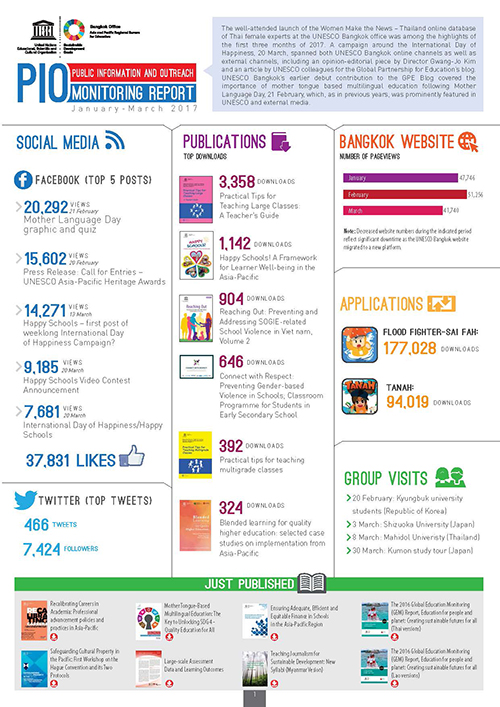 The well-attended launch of the Women Make the News – Thailand online database of Thai female experts at the UNESCO Bangkok office was among the highlights of the first three months of 2017. A campaign around the International Day of Happiness, 20 March, spanned both UNESCO Bangkok online channels as well as external channels, including an opinion-editorial piece by Director Gwang-Jo Kim and an article by UNESCO colleagues for the Global Partnership for Education’s blog. UNESCO Bangkok’s earlier debut contribution to the GPE Blog covered the importance of mother tongue based multilingual education following Mother Language Day, 21 February, which, as in previous years, was prominently featured in UNESCO and external media.
The well-attended launch of the Women Make the News – Thailand online database of Thai female experts at the UNESCO Bangkok office was among the highlights of the first three months of 2017. A campaign around the International Day of Happiness, 20 March, spanned both UNESCO Bangkok online channels as well as external channels, including an opinion-editorial piece by Director Gwang-Jo Kim and an article by UNESCO colleagues for the Global Partnership for Education’s blog. UNESCO Bangkok’s earlier debut contribution to the GPE Blog covered the importance of mother tongue based multilingual education following Mother Language Day, 21 February, which, as in previous years, was prominently featured in UNESCO and external media.

